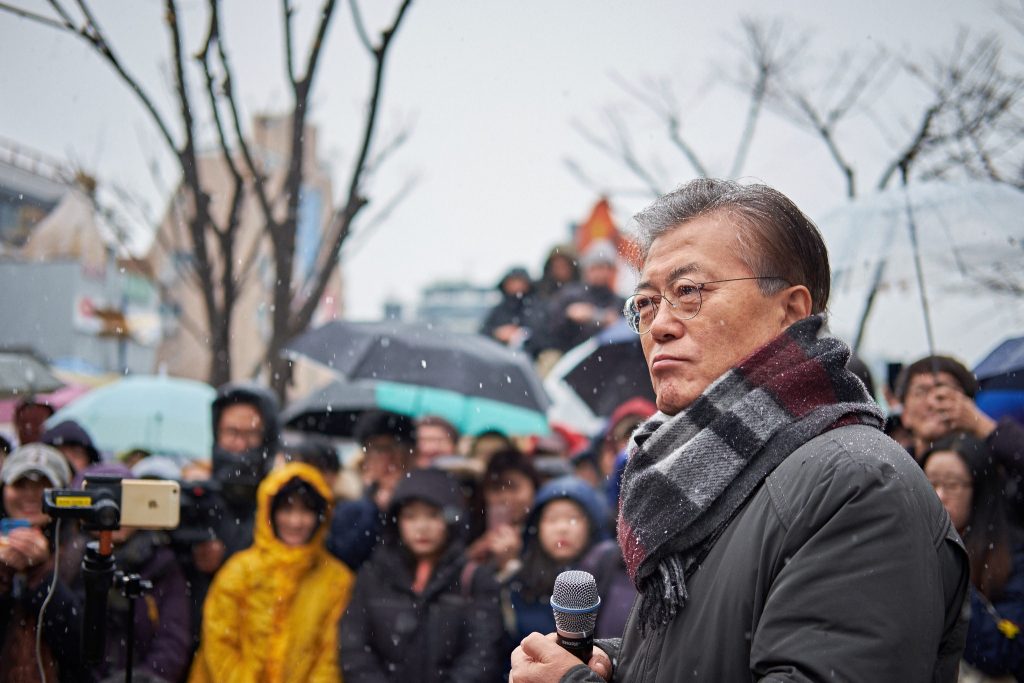Is South Korea’s New President up to the Job?
Former human-rights attorney Moon Jae-in has won the South Korean presidential elections. His supporters expect above all a fight against cronyism and fundamental economic reforms. Relations with neighbors and allies are tense.
On Wednesday, Moon Jae-in was sworn in for a five-year term as South Korea’s president. Winning 41 percent of the votes in Tuesday’s early presidential election, the liberal Democratic Party candidate clearly prevailed over the conservative Hong Joon-pyo (23%) and centrist Ahn Cheol-soo (21%). In his inauguration speech, Moon promised to create a “just, united country,” and also to serve those people who had not supported him. Yet rarely has so much been at stake for South Korea, both domestically and internationally.
Chaebols no longer untouchable
A corruption scandal has shaken the country for months. Previous President Park Geun-hye (2013 – 2017), who defeated the second-place Moon in the previous elections in 2012, has left her successor a political mess. Her disastrous crisis management and cover-up attempts in connection with the sinking of the Sewol ferry in April 2014, in which 300 schoolchildren drowned, had quickly made Park the least-popular president since democratization in 1987. A corruption scandal entangling the president and the country’s economic elite ultimately cost her the office prematurely.
For decades, large family-run conglomerates (chaebol) such as Samsung, Hyundai and Lotte, all with close connections to the state, have dominated the country’s economic landscape. Today, the Samsung Group alone accounts for one-fifth of all exports and a quarter of all shares on the national stock exchange. The recent scandal has once again demonstrated the strength of the bonds between the powerful family clans and the political class. The Bertelsmann Stiftung’s Transformation Index (BTI) rates South Korea’s anti-corruption policy lower than that of Botswana, Bhutan or Georgia – certainly a poor testimonial to the quality of economic justice in the world’s 11th-largest economy.
However, the ongoing public and legal handling of the most recent scandal also demonstrates that the chaebols are no longer untouchable. Moon’s call for economic reforms thus comes at the right time. Currently, bribery proceedings are also taking place against Lee Jae-young, the de facto head of the Samsung Group, and Shin Dong-bin, head of the Lotte conglomerate.
Moon should use his electoral mandate and the current focus on economic corruption for rapid structural economic reforms, in order to render the system less susceptible to corruption over the long term. On Wednesday, the new president announced a chaebol reform providing more rights to minority shareholders and imposing a ceiling on capital investments with the aim of preventing excessive business expansions. Further reform steps are necessary. Above all, small and medium-sized enterprises need better market access. Existing oligopolistic structures must be diversified. Genuine reform of the economic system alone would be a Herculean task requiring at least one presidential term.
The return of Sunshine Policy?
Yet no less challenging is the intricate foreign-policy state of affairs into which ex-President Park and interim President Hwang Kyo-ahn have led the country. Before the election, they allowed Washington to install its THAAD missile-defense system on South Korean soil and make it combat-ready, thus presenting THAAD opponent Moon with an accomplished fact. As a candidate, Moon moderated his position in the campaign’s final days, promising simply to review the deployment, but he also demanded that the United States must “respect South Korea’s democracy.” Internationally, the missile-defense system has triggered particularly intense opposition from China, South Korea’s largest trading partner. In response to the THAAD deployment, Beijing has deliberately weakened the South Korean economy through informal channels. President Moon, who has indicated he wants to play a bigger, more independent role in the joint alliance with the United States and Japan, will have to make concessions to China.
One example of this could come in North Korea policy. In this area, there is considerable consistency between the interests of China and the new South Korean leadership. President Moon, whose family comes originally from Hungnam in North Korea, will seek dialogue with the Pyongyang government, and possibly even attend a summit meeting there. As chief of staff under the last liberal President Roh Moo-hyun (2003 – 2008), he already supported a policy aimed at reducing tension and seeking coexistence with the country’s northern neighbor. The South Korean Ministry of Land, Infrastructure and Transport is currently developing new joint infrastructure projects for the North Korean mining sector. There is currently no support for such a policy from the United States or Japan, the country’s alliance partners. Moreover, despite the welcome South Korean foreign exchange, North Korea’s leadership too is likely to regard the inevitable contact between its population and representatives of South Korean firms critically, as this could undermine the state propaganda asserting foreign nations’ implacable hostility. Moon therefore has considerable work to do in convincing both sides.
Both internally and externally, Moon faces apparently insoluble tasks. Yet Moon’s life has been defined by self-assertion against seemingly unassailable structures. In 1975, the military dictatorship under Park Chung-hee (1961-1979) placed the law student at the renowned Kyung Hee University in prison following his organization of anti-regime protests, spoiling his career prospects as a judge, and a year later forced him into service in an elite armed-forces unit and sent him on a life-threatening mission in the Demilitarized Zone. Today, his predecessor Park Geun-hye, daughter of the military dictator, sits in pre-trial detention, while Moon Jae-in is writing a new chapter in South Korean history as president.
Robert Schwarz is Project Manager at the Bertelsmann Stiftung’s Transformation Index (BTI). He holds a M.A. degree in Peace and Global Governance from Kyung Hee University’s Graduate Institute of Peace Studies in South Korea and specializes in governance issues in East Asia.

